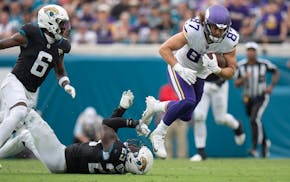With every whistle blown, the collection of sweat beads on Richard Pitino's forehead seemed to grow a little thicker.
Tweet! The Gophers coach threw his hands in the air.
Tweet! Off came the coat, tossed feverishly to the bench.
Tweet! Off came the tie with one swift pull, sent to join the coat.
In all, there were 52 tweets for fouls called in the Gophers' Dec. 3 game against Florida State, which not surprisingly took nearly 2½ hours to complete. The slow pace resulted in the Williams Arena fans hurling choice barbs at officials and loudly complaining about the parade of stoppages.
Welcome to the college basketball rules transition period; it's frequently messy in here.
Before the season, the NCAA instigated two new major rules aimed to increase scoring by making the game less physical: Reducing hand-checking by defenders and making it tougher for defensive players to get charge calls. The rules have, at least in the first two months of the 2013-14 season, altered the college game, changing strategy for some coaches and leaving others wondering about the lack of consistency in officiating.
Pitino repeatedly has expressed his support of the changes, but it's clear that even he, at times, is irked with the new manifestation; his players, at times, have looked confused about what will be called and what won't.
"I think that a lot of people are going to be very frustrated at first," Pitino said. "The fans are going to be extremely frustrated at first. But I think it's good for basketball, because [the games] were turning into slugfests."
The hand-checking rule put in place several more conservative guidelines on the types of contact that will be called in regard to defending the person with the ball. Putting two hands on an opponent is a foul, as is continually jabbing an opponent.
The second deals with charge calls — tweaking the rule so that the defender must be in legal guarding position when a player with the ball goes into his upward motion to pass or shoot, rather than when the collision actually occurs.
Some love the changes. Iowa coach Fran McCaffery called the shift in charge calls "a great move by the NCAA." Ohio State's Thad Matta said games are "cleaner" and asserted games are being "called the right way" now. And Syracuse's Jim Boeheim has taken the same stance that Pitino has most of the time: The adjustments will ultimately make the game better and less physical.
"[The game] was too physical and there is a better chance for offensive movement [with the new rules]," Boeheim said. "I think in the long run it will be good, even if there will be some growing pains in the course of the year."
Strategy changes
But not everyone agrees. Around the country, the results are obvious. Free throws have become a bigger part of the game, with the free-throw-to-field-goal attempt percentage jumping from .359 last season to .413.
Many coaches see offenses around the country changing as teams try to adapt.
"I think over the course of time, there will be a lot more isolations and dribble drives," Dayton coach Archie Miller said. "You say you want to share the ball, you want to move the ball, but it pays now to put the ball in areas where you're going to get fouled — whether that be in the post or on the perimeter where you're driving — because you're putting [the defense] in a position that's very hard. It's very hard to defend off the dribble and in the post without using your body, and your hands."
As a result, some say, while games have opened up some around the perimeter, they are more physical in the paint than ever.
Gonzaga coach Mark Few, whose teams have always been good at taking charges, has now started questioning whether he should even teach his players to try to draw charges in those situations.
"[Teams are] just turning their guards loose, especially in transition," Few said. "They're coming at guys — almost recklessly coming at guys, because you really can't take charges anymore.
"I think we've got to get to a balance where we're letting free flow and movement, but I don't think you should reward bad basketball, you know? Otherwise we should just go sign a bunch of track athletes and teach them how to dribble and run into people."
The Gophers have appeared to adjust better than some teams — sending opponents to the free-throw line far less than the national average. For every field goal attempt, Gophers opponents have .35 free-throw attempts compared to the national average of .41, according to kenpom.com, the website for college basketball analyst Ken Pomeroy.
That's somewhat surprising considering that the Gophers often employ a full-court pressure defense for 30-35 minutes a game. Pitino likes to praise players using their heads and fundamental footwork — players defending by getting in front of an opponent rather than with their hands.
Seeking consistency
But it's hard to tell how much of their successes have been soundly abiding by the new rules and how much has been the variation between officiating crews. In the games against Montana and, most dramatically, against Florida State, officials seemed more aggressive in calls than other games the Gophers have played.
"Some calls didn't go our way, with the guys just barreling into our players," Andre Hollins said after the 71-61 victory over Florida State. "But that's how it goes sometimes, and I like how we responded to that."
The biggest complaint among coaches, in fact, is that calls haven't been close to consistent early on.
Michigan State's Tom Izzo has found new challenges in the team's film sessions, when he goes over the previous game.
"[They'll] say, 'Coach, why could we play this way in the first half and not in the second?' " Izzo said. "And I'd have to agree with them."
Most realize that this period, when everyone is trying to find a balance, will be the worst. Some think it's only the start of more changes. Sports Illustrated writer Seth Davis has said he thinks the next step is to widen the lane to open up the game even more.
Ultimately, the hope is that when the dust settles, the game will be better for the trouble.
"It's not going to happen overnight," Izzo said. "We think coaches are going to adjust immediately — they're not. We think players are going to adjust immediately — they're not. We think officials are going to adjust immediately — they're not. This is a process. I don't like it, I don't love it, but I understand it and I'm going to do a better job of coaching it."

Minnesota's PWHL champion begins camp amid change, with name: Frost

'Really talented' duo positions Vikings to ease into Hockenson's return

Souhan: Lindsey Vonn returns to U.S. Ski Team

How will Vikings' Bynum top his latest viral celebration?
